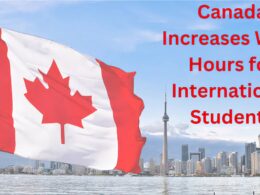Understanding and acting on available options can be crucial in successfully transitioning toward permanent residency or maintaining status in Canada.
Ottawa – As many international graduates and temporary foreign workers in Canada face the looming expiration of their work permits, uncertainty about the next steps has become a common concern.
With recent policies providing work permit extensions having come to an end, numerous individuals find themselves at risk of falling out of status. If you or someone you know is navigating this challenging transition, here are ten actionable strategies to consider.
- Stay Legally Compliant
Maintaining legal status in Canada is crucial. Before your work permit expires, consider switching to a visitor record. You may also apply for restoration within 90 days of its expiration to regain your temporary resident status and obtain new work permit.The key is to avoid losing your status at all costs. More information about the restoration process is available through Immigration, Refugees and Citizenship Canada (IRCC). - Provincial-Based Work Permit Extensions
Several provinces offer work permit extension options for those eligible under provincial nominee programs. Provinces such as Manitoba, Alberta, and Yukon have agreements with IRCC, which might facilitate permit extensions. Additionally, places like Newfoundland and Labrador issue work-permit support letters for applicants with local job offers. Checking with your province could open new possibilities. - Bridging Open Work Permit (BOWP)
If you’ve applied for permanent residency (PR) through an eligible program, you might qualify for a Bridging Open Work Permit (BOWP). This permit allows you to continue working while awaiting your PR decision. Understanding whether you qualify for BOWP could be a crucial step in maintaining employment. - Exploring Other Work Permit Types
Those with valid status may explore alternative work permits. For instance, closed work permits may be available if you secure a job offer backed by a Labour Market Impact Assessment (LMIA). You can also consider LMIA-exempt permits, such as those offered under the Francophone Mobility Program. Exploring these options could be beneficial. - Switching to Another Temporary Residence Status
Applying for a different temporary residence status could be viable. For example, consider pursuing further studies in Canada, which would allow you to apply for a study permit. Note that postgraduate work permit holders cannot obtain another PGWP if they return to school for a new program, as PGWPs are issued only once. - Gaining Work Experience Outside Canada
Remaining in Canada does not restrict you from remote work for an employer located outside the country. Gaining relevant foreign work experience, especially in fields prioritized by Express Entry, could strengthen your PR application. Remote work in these areas could be a strategic move. - Spousal Sponsorship
If you are married to or in a common-law partnership with a Canadian citizen or permanent resident, you may be eligible for spousal sponsorship. This path to permanent residency doesn’t require a job offer, work experience, language tests, or credential assessments. Sponsorship is a straightforward option for eligible couples. - Educational Pathways for Dependent Spouses
If you are in Canada with a spouse or partner, consider the educational route. If your spouse decides to study in Canada, you could be eligible for a spousal open work permit, which allows you to work while they pursue their program. This option can be a stepping stone for your continued stay in Canada. - Seeking Work Opportunities Abroad
In some cases, leaving Canada to gain work experience in high-demand fields may improve your chances of PR. Prioritize work in sectors that align with category-based selection draws under Express Entry. This approach may position you more competitively for future applications. - Consult with an Immigration Expert
Navigating Canada’s immigration landscape can be complex, and each case is unique. Speaking with licensed immigration consultants or lawyers can provide personalized advice and uncover additional options you may not be aware of. Timely professional guidance is essential for making informed decisions.
These strategies offer a roadmap for individuals in precarious situations as their work permits expire. Understanding and acting on available options can be crucial in successfully transitioning toward permanent residency or maintaining status in Canada.









Join our Channel...